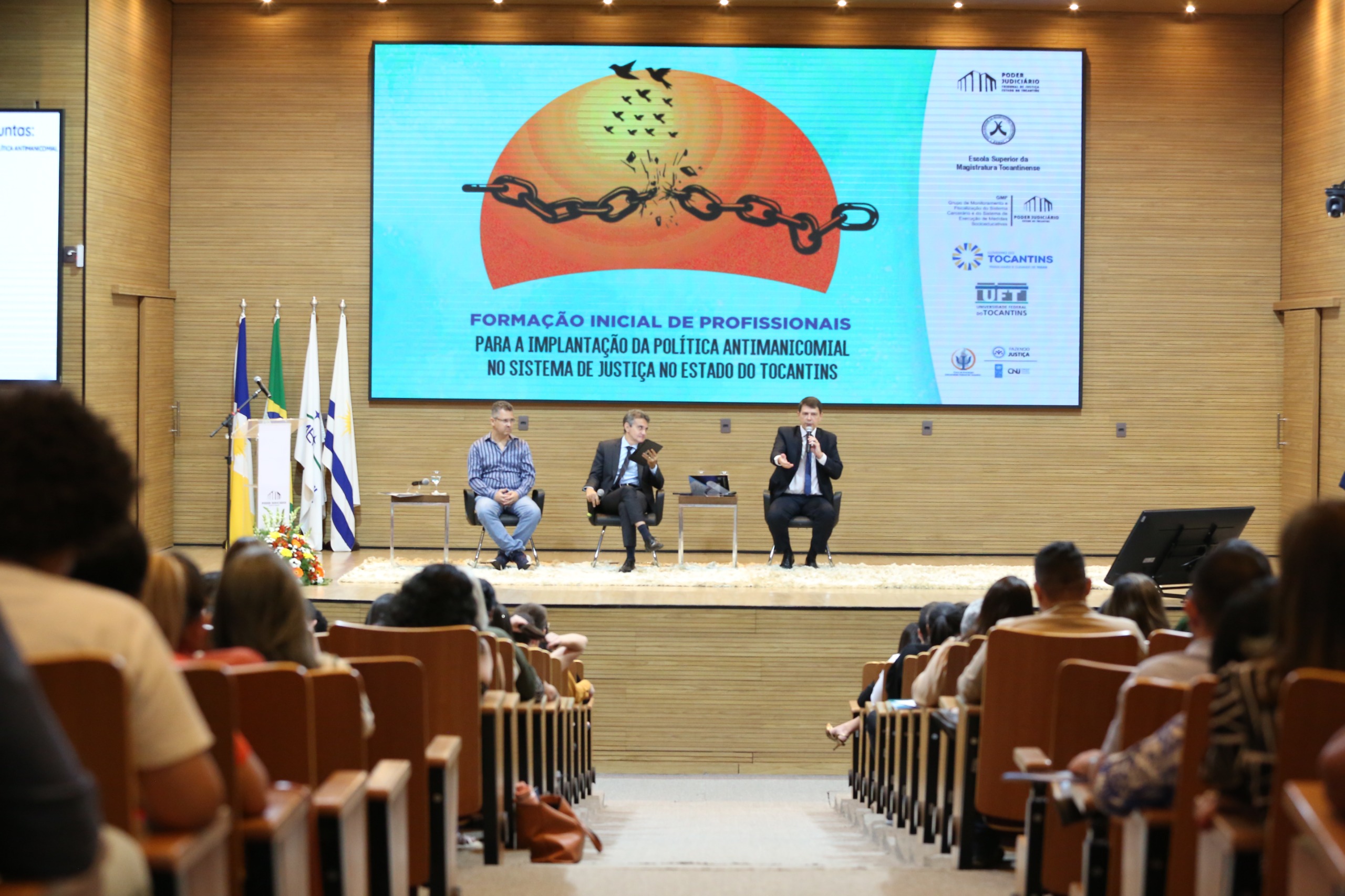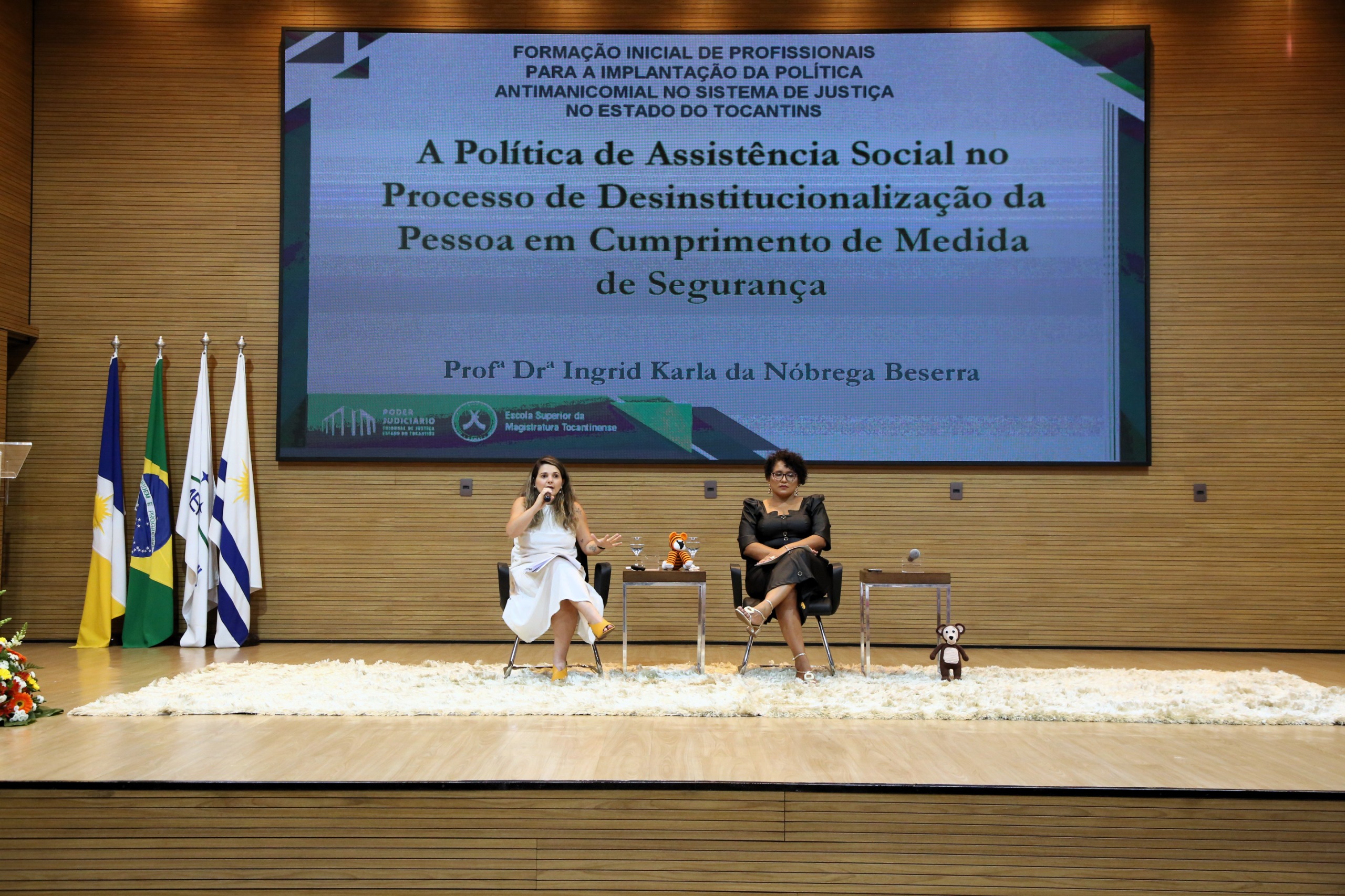
Mental health, the role of social assistance and deinstitutionalization were the topics debated during the second day of the Initial Training of Professionals for the Implementation of the Anti-Asylum Policy in the Justice System of the State of Tocantins, held this Thursday (August 29th), in the auditorium of the Court of Justice of the State of Tocantins (TJTO), in the city of Palmas.
The event, which continues until Friday (August 30th), aims to train professionals from the justice system, municipal managers and workers from the social and prison care network, with a view to implement the anti-asylum policy and provide qualified care for people in conflict with the law and who have mental disorders.
The first lecture of the day, “Security Measures under the aegis of the Resolution 487 of the CNJ”, was given by Luís Fernando Nigro Corrêa, Professor and Judge at the Court of Justice of the State of Minas Gerais, and Carlos Mendes Rosa, PhD in clinical psychology and Professor at the Federal University of the State of Tocantins (UFT). The state coordinator for mental health policy in the State of Tocantins, Judge Allan Martins Ferreira, also took part.
Mental health and attention to health
Mental health care at the three levels of care of the Unified Health System (SUS), focusing especially on the perspective of care in freedom of territory, was another topic discussed during a round table on Thursday (August 29th).
“The idea is not to present a manual on how to work in the primary, secondary and tertiary care, but what are the principles that should guide practices at these three levels of mental health care in the Unified Health System,” said Professor Vânia Damasceno Costa, bringing a perspective of the expanded and shared clinic, which is a normative technical guideline of the SUS, which today has a perspective of care, an integral view of the subject, looking at it from the logic of the psychosocial care.
The Professor shared some of this understanding and, from there, how the State of Tocantins is currently organized within the psychosocial care network and how it can use the devices that already exist for mental health care, without necessarily having to create new ones. “Obviously this is important for structuring a strengthened network, but especially understanding how to do it, how to take care of the mental health aspects of people, of the population, in the existing services of the Unified Health System. Well, I think that's the general point I'm going to explore a bit at the table today”.
Professor Altieres Edemar Frei talked about the Singular Therapeutic Project, which is a SUS strategy for mental health care. “It can be done in specialized care, in the case of CAPS, but it can also be done in the primary health care, in the case of basic health units,” he commented, mentioning that the Singular Therapeutic Project has a few stages, such as defining goals, assignments and a diagnostic survey. “And also combining this, of course, with those who matter, which is the user of the mental health service.”
For the Professor, defending the SUS is the first topic and the second is how to bring mental health policy down, as we say, from specialized care, from urgent and emergency care, but down to the primary health care,” he said, emphasizing that he is going to focus on mental health in each Basic Health Unit (UBS). “In each health center we have either minimum teams or a structure to deal with mental health cases.”
Social assistance and deinstitutionalization
To close the day, Ingrid Karla da Nóbrega Beserra, PhD, Professor and coordinator of the Social Work Course at the Federal University of the State of Tocantins (UFT), spoke about “Social Assistance Policy in the process of deinstitutionalizing people serving security measures”. According to her, it is important to reinforce the role of intersectorality when implementing deinstitutionalization.
Considering that various public policies are and should be involved in this process, not just health policy, not just the justice system, but all public policies, civil society, also involving other institutions, in general, the university and all the people who are interested in building this collective debate.
The Professor also emphasized that it is necessary to consider that social assistance, as a public policy that has already been institutionalized and is considered consolidated in Brazil, “can also contribute to this process in order to make these rights effective and guarantee this access as well”. The lecture was mediated by Helenilva Custódio de Melo, a social worker from the State Health Department.
Exchange of experience
The team of the Secretariat of Social Assistance of the city of Natividade (TO), composed by the secretary Noemi Cerqueira, the psychologist of the urban area Adriana Marinho Rios, and the psychologist of the rural area Lairy Iorrane Castro, was present at the training.
According to Secretary Noemi, "the event is of extreme importance in order to continue psychiatric reform, with the aim of ensuring that these people have their human rights respected and are treated with dignity and citizenship. It seeks to consolidate an open and community-based model of mental health care for professionals working in the interior of the State, the aspirations are glaring with regard to the effective implementation of the services offered and the guarantee of therapeutic freedom".




